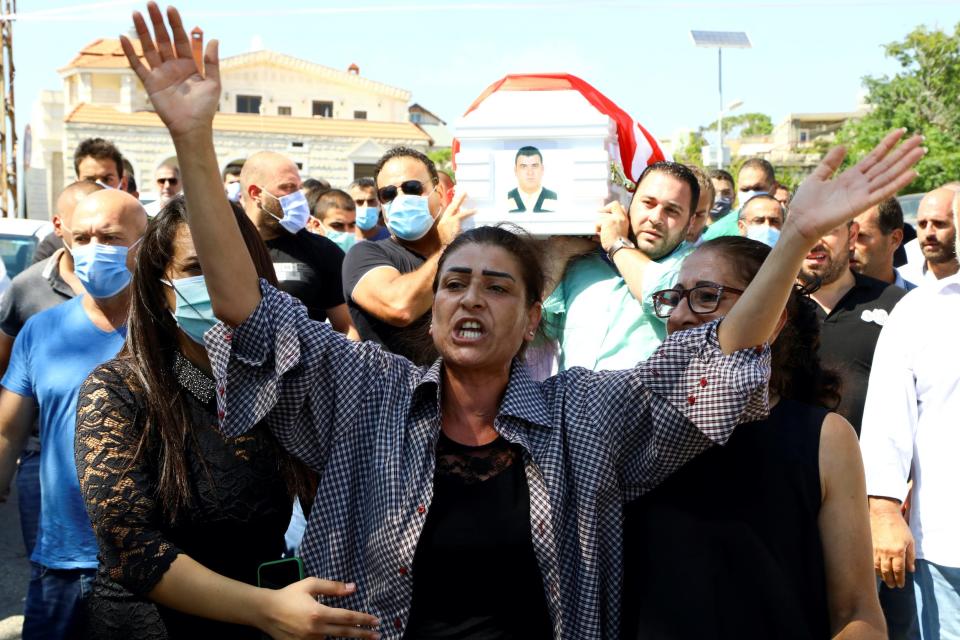Lebanon was already cash-strapped and on the brink. The Beirut explosion could shatter its residents.

Photo by STR/AFP via Getty Images
The explosion in Beirut, Lebanon, on Tuesday that killed at least 135 people and injured 5,000 others could not have come at a worse time for the country in crisis.
In the last year, the country's economy spiraled out of control and the local currency's value has plummeted, while food prices and unemployment have skyrocketed.
Many Lebanese blame the situation on the country's rulers' corruption and negligence.
BEIRUT, Lebanon — Twenty-four hours after an explosion demolished Beirut Port and much of the city, Lebanon remained distraught and in disarray.
With at least 135 dead, 5,000 wounded, and more than 100 missing, first responders continue to find bodies at the port and under the rubble in the Lebanese capital. Some 300,000 residents were rendered homeless, while others try to find ways to repair material damages and secure basic necessities for their families.
The explosion in the Lebanese capital on Tuesday appeared to be the result of a confiscated container of 2,750 tons of ammonium nitrate — an explosive chemical compound — that had not been tended to in six years. Buildings as far as 7 miles away were impacted by the blast.
Horror ensued at Lebanon's hospitals. Packed with the wounded and short on supplies, people were treated on floors, parking lots, and sidewalks.

Edmound Khnaisser via REUTERS
"I saw things you simply cannot imagine," a medical resident working at a Beirut hospital told Business Insider. "We've accepted everything from the economic crisis to the decimation of the revolution, and even the damn pandemic. But does Beirut have to be charred like this?"
Following the tragic incident, Prime Minister Hasan Diab vowed that those responsible would "pay the price."
But cash-strapped Lebanon is already paying the price of what many say is the corruption and negligence of its rulers.
On top of this tragedy is the marking of 11 months since the economy began to spiral out of control. In the last year, the local currency's value has depreciated by about 80%, coupled with skyrocketing food prices and unemployment.
The banks closed right when people needed cash to deal with the disaster
People have struggled to withdraw cash, with banks rapidly losing liquidity.
Banks' withdrawal and payment restrictions have become more restrictive over time. The devaluation of the currency means that people's savings have basically evaporated, decimating an already shrinking Lebanese middle class.
After the explosion, the banks closed all their branches on Wednesday.

REUTERS/Aziz Taher
Lebanese economist and researcher Sami Zoghaib told Business Insider that people will now truly feel the pain of these restrictions at the bank.
"People that will now be in need of some of the savings they have been able to put into the banks over their lifetimes now cannot access it when they most need it," Zoghaib said, explaining that people will need money to cover costs related to healthcare and repairs, for both themselves and their loved ones.
He continued: "I mean, this is why you have savings: to fix your house when a catastrophe happens or help a relative if they need healthcare."
The economist said that the banks deciding to close the banks following the tragedy, rather than giving people special "exceptions" to access their own money, was another slap in the face of a distraught population.
"The first things the banks do is try to cover up their own interests," Zoghaib said. "This is terrible."
'The corruption and mismanagement of Lebanon's ruling class has brought the country to its knees'
With the Beirut Port destroyed, this already harrowing scene could look even grimmer.

Mohamed Azakir/Reuters
The capital's port is a pivotal economic gateway for the country, which relies on imports for 80% of its products. In 2018, the Beirut Port handled 72% of Lebanon's total imports, and 51% of its exports.
Lebanon's local wheat production is far lower than its imports, which it tripled in the years preceding the economic crisis.
But the country's fiscal crisis and US dollar shortage has made importing an ardent task.
Prior to the port's destruction, imports had already fallen by about half, wheat included. As a result, the price of 2 lbs. of partially subsidized bread increased by 33% from 1,500 Lebanese pounds to 2,000.
At the same time, Lebanon relies on importing fuel for electricity. Shortages left much of the country in darkness on many days in July.
Doctors and medical workers rely on imports for everything from protective equipment to life-saving medicines. And while imports have staggered, the explosion means that, for the time being, they're at a near complete halt.

REUTERS/Karamallah Daher
Human Rights Watch Lebanon researcher Aya Majzoub told Business Insider that the poorly planned economy has ultimately punished the population, and the explosion at the Beirut Port was another blow to a people already suffering.
"The corruption and mismanagement of Lebanon's ruling class has brought the country to its knees," Majzoub said. "It is unable to adequately respond to the needs of its residents in the midst of this national tragedy."
But Majzoub said Lebanon cannot use the economic crisis as an excuse for inaction.
"Despite the resource restrictions, Lebanon is obligated to provide all of its residents — without discrimination — access to basic services and rights, like food, water, and healthcare."
But far too few of the country's population have faith that their government will step up.
On Thursday, volunteers helping clear the rubble in the streets surrounded French President Emmanuel Macron's visiting convoy, chanting anti-government slogans.
The military had to use force to clear the road for the convoy to pass.
Read the original article on Business Insider

